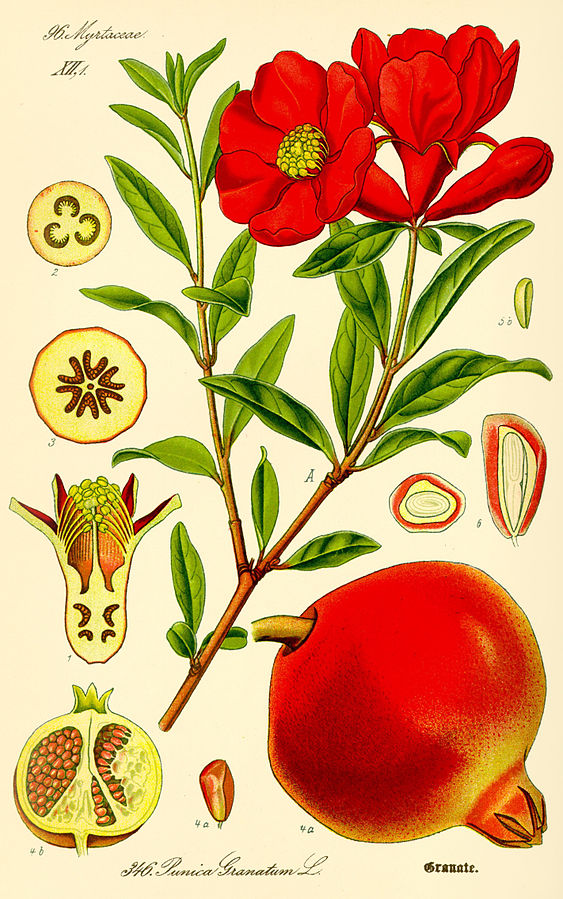Common Name: Pomegranate
Background
- The pomegranate fruit has a leathery rind (or husk) with many little pockets of edible seeds and juice inside.
- Since ancient times, the pomegranate has been a symbol of fertility.
- Researchers have studied all parts of the pomegranate for their potential health benefits. Those parts include the fruit, seed, seed oil, tannin-rich peel, root, leaf, and flower.
- The pomegranate has been used as a dietary supplement for many conditions including wounds, heart conditions, intestinal problems, and as a gargle for a sore throat.
- Pomegranate is made into capsules, extracts, teas, powders, and juice products.
How Much Do We Know?
- We don’t have a lot of strong scientific evidence on the effects of pomegranate for people’s health.
What Have We Learned?
- A 2012 clinical trial of about 100 dialysis patients suggested that pomegranate juice may help ward off infections. In the study, the patients who were given pomegranate juice three times a week for a year had fewer hospitalizations for infections and fewer signs of inflammation, compared with patients who got the placebo.
- Pomegranate extract in mouthwash may help control dental plaque, according to a small 2011 clinical trial with 30 healthy participants.
- Pomegranate may help improve some signs of heart disease but the research isn’t definitive.
What Do We Know About Safety?
- Some people, particularly those with plant allergies, may be allergic to pomegranate.
- It’s unclear whether pomegranate interacts with the anticoagulant (blood thinning) medicine warfarin or drugs that work similarly in the body to warfarin.
- Federal agencies have taken action against companies selling pomegranate juice and supplements for deceptive advertising and making drug-like claims about the products. For more on this, view the NCCIH Director’s Page entitled Excessive Claims.
Keep in Mind
- Tell all your health care providers about any complementary or integrative health approaches you use. Give them a full picture of what you do to manage your health. This will help ensure coordinated and safe care.
For More Information
NCCIH Clearinghouse
The NCCIH Clearinghouse provides information on NCCIH and complementary and integrative health approaches, including publications and searches of Federal databases of scientific and medical literature. The Clearinghouse does not provide medical advice, treatment recommendations, or referrals to practitioners.
PubMed®
A service of the National Library of Medicine, PubMed® contains publication information and (in most cases) brief summaries of articles from scientific and medical journals. For guidance from NCCIH on using PubMed, see How To Find Information About Complementary Health Approaches on PubMed.
Office of Dietary Supplements (ODS), National Institutes of Health (NIH)
ODS seeks to strengthen knowledge and understanding of dietary supplements by evaluating scientific information, supporting research, sharing research results, and educating the public. Its resources include publications (such as Dietary Supplements: What You Need to Know), fact sheets on a variety of specific supplement ingredients and products (such as vitamin D and multivitamin/mineral supplements), and the PubMed Dietary Supplement Subset
Key References
- Al-Zoreky N. Antimicrobial activity of pomegranate (Punica granatum) fruit peels. International Journal of Food Microbiology. 2009;134(3):244-248.
- Bhadbhade SJ, Acharya AB, Rodrigues SV, et al. The antiplaque efficacy of pomegranate mouthrinse. Quintessence International. 2011;42(1):29-36.
- Hanley MJ, Masse G, Harmatz JS, et al. Pomegranate juice and pomegranate extract do not impair oral clearance of flurbiprofen in human volunteers: divergence from in vitroresults. Clinical Pharmacology & Therapeutics. 2012;92(5):651-657.
- Ismail T, Sestili P, Akhtar S. Pomegranate peel and fruit extracts: a review of potential anti-inflammatory and anti-infective effects. Journal of Ethnopharmacology. 2012;143(2):397-3405.
- Mirmiran P, Fazeli MR, Asghari G, et al. Effect of pomegranate seed oil on hyperlipidemic subjects: a double-blind placebo-controlled clinical trial. British Journal of Nutrition. 2010;104(3):402-406.
- Pomegranate. Natural Medicines Web site. Accessed at naturalmedicines.therapeuticresearch.com/ on June 4, 2015. [Database subscription].
- Shema-Didi L, Sela S, Ore L, et al. One year of pomegranate juice intake decreases oxidative stress, inflammation, and incidence of infections in hemodialysis patients: a randomized placebo-controlled trial. Free Radical Biology and Medicine. 2012;53(2):297-304.
- Southgate MT. The cover. Pomegranate jars. JAMA. 2007;297(8):781.
- Stowe CB. The effects of pomegranate juice consumption on blood pressure and cardiovascular health. Complementary Therapies in Clinical Practice. 2011;17(2):113-115.
- Syed DN, Afaq F, Mukhtar H. Pomegranate derived products for cancer chemoprevention. Seminars in Cancer Biology. 2007;17(5):377-385.
This publication is not copyrighted and is in the public domain. Duplication is encouraged.










+ There are no comments
Add yours